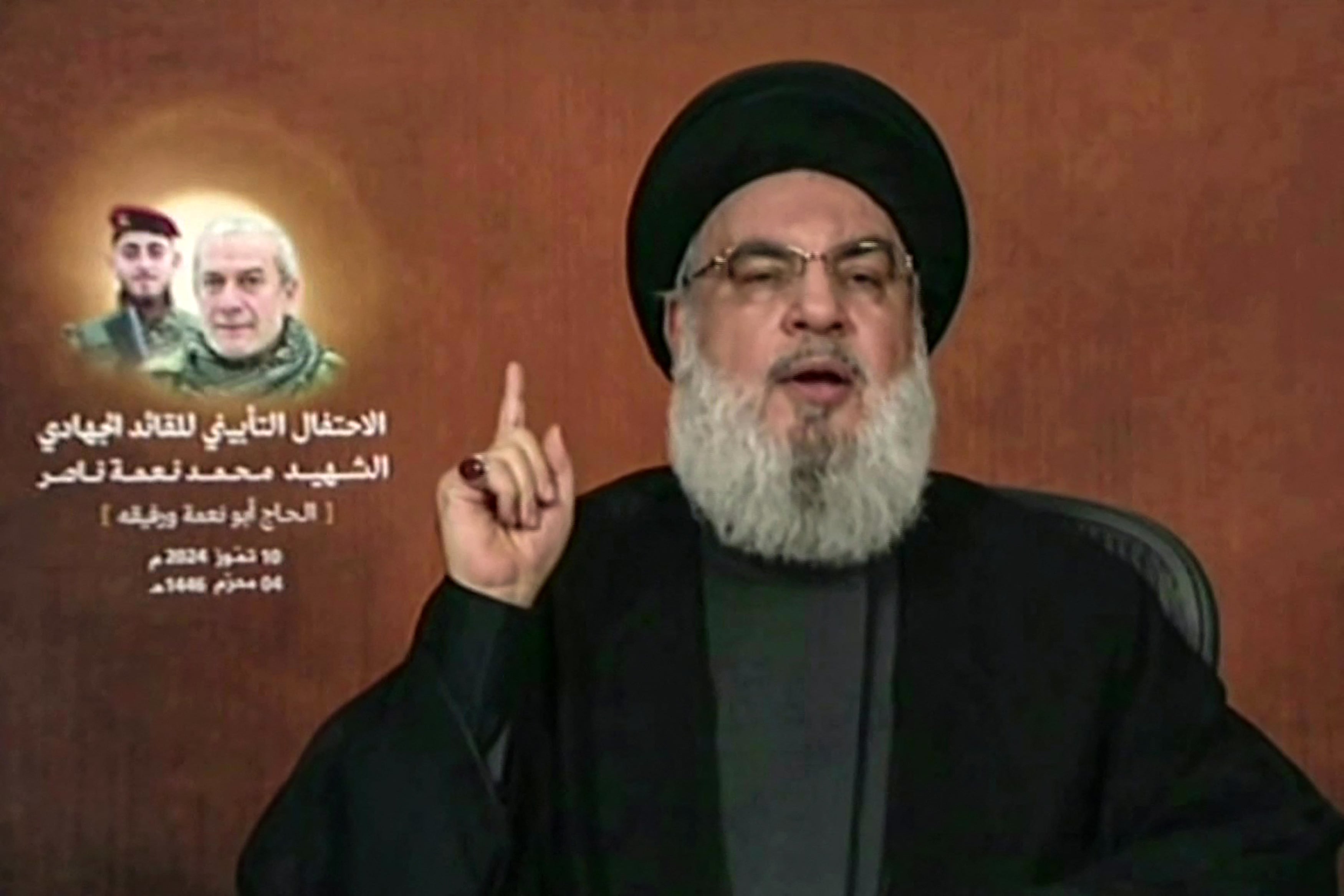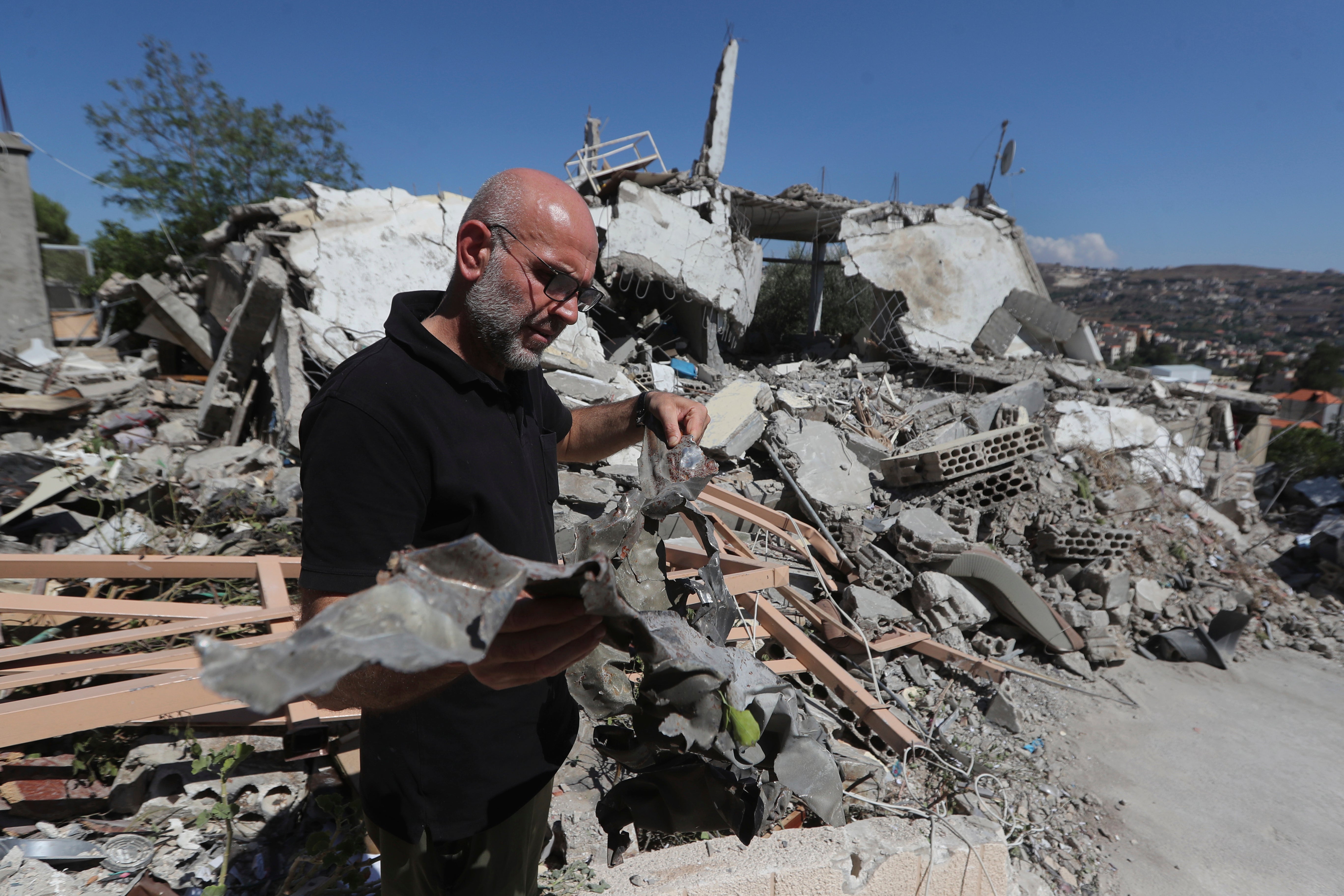Hezbollah vows to hit new targets in Israel if Lebanon civilians keep dying – as fears mount over wider war
Hezbollah and Israel have been exchanging cross-border fire since shortly after the war in Gaza started

Your support helps us to tell the story
From reproductive rights to climate change to Big Tech, The Independent is on the ground when the story is developing. Whether it's investigating the financials of Elon Musk's pro-Trump PAC or producing our latest documentary, 'The A Word', which shines a light on the American women fighting for reproductive rights, we know how important it is to parse out the facts from the messaging.
At such a critical moment in US history, we need reporters on the ground. Your donation allows us to keep sending journalists to speak to both sides of the story.
The Independent is trusted by Americans across the entire political spectrum. And unlike many other quality news outlets, we choose not to lock Americans out of our reporting and analysis with paywalls. We believe quality journalism should be available to everyone, paid for by those who can afford it.
Your support makes all the difference.Hezbollah has vow to strike new targets in Israel if civilians in Lebanon continue to be killed by cross-border airstrikes, as fears grow the tensions on Israel’s northern could become full-blown war.
Five civilians, including three children, were killed in Israeli strikes in Lebanon on Tuesday and at least three Lebanese civilians were killed the day before, according to state media and security sources. More than 460 people have been killed in Lebanon in total since last October, the country’s Ministry of Health says, though the vast majority are Hezbollah militants.
Israel and Hezbollah, the most powerful military and political force Lebanon, have been trading fire since shortly after its ally Hamas attacked southern Israel on 7 October triggering Israel's ensuing military offensive in Gaza. Both Hezbollah and Hamas are backed by Iran, but unlike Hamas, Hezbollah has the firepower to seriously threaten Israel.
Hezbollah leader Sayyed Hassan Nasrallah said the group would be “pushed” to widen their targets in Israel if more civilians are killed.
“Continuing to target civilians will push the Resistance to launch missiles at settlements that were not previously targeted,” Nasrallah said, in comments made during a televised address to mark the Shia holy day Ashoura. Hezbollah militants use the phrase settlements to refer to Israeli population centres.
He also promised that totally or partially destroyed homes in Lebanon would be rebuilt “more beautiful than they were before”.

After Hamas launched the 7 October attack, killing around 1,200 people and taking 251 hostage, with about half still being held in Gaza, Hezbollah announced a “support front” against Israel. Recently, Israeli defence minister Yoav Gallant threatened to send Lebanon “back to the Stone Ages” if the cross-border attacks escalate too steeply.
Fears have grown in recent weeks that Israel may expand its military operations in Lebanon, risking a wider war. Israel has said it is undertaking the necessary preparations for a wider operation but no decision has yet been made. Hezbollah has said it does not want war with Israel but is ready for it.
Iran-aligned groups across the region, including armed factions in Syria and Iraq and Yemen’s Houthis, have also been hitting what they call Isrel-linked targets.
Western countries, led by the US, have been stationed in the Red Sea for months to mitigate against the threat posed by Houthi attacks on commercial shipping vessels – which have included ships not linked to Israel – while officials have attempted to prevent another war breaking out in the region between Israel and Hezbollah.
In Gaza, where Israel’s nine-month-long assault on Hamas has killed more than 38,000 Palestinians according to the local health ministry, Israeli forces pounded areas in the centre of the strip on Wednesday. Local officials said at least nine civilians in airstrikes, while tanks carried out a limited advance into Rafah in the south.
In one Israeli air strike around midnight in the central Gaza Strip, eight people were killed, health officials in the Hamas-run territory said. Another strike killed a man in Nuseirat camp, one of the enclave’s eight refugee camps, where 23 people were killed in an Israeli air strike on a school a day ago.
Israeli tanks also shelled the eastern areas of two camps in the centre of the enclave, residents said, while they also claimed an air strike destroyed a mosque.
Meanwhile in Rafah, tanks carried out a raid in the north of the city before retreating, a tactic Israeli forces have used in other areas before mounting deeper incursions. Tanks have operated in most parts of the city since May, although have not gone deep into the northern districts.
Medics said an Israeli strike killed two people in Rafah on Wednesday, while residents said the forces had blown up dozens of homes.
The Israeli military said troops were “continuing precise, intelligence-based operational activity in the Rafah area”. It said they had eliminated what it called a terrorist cell and a launcher that had been used to fire at troops.
It said airstrikes had struck 25 targets throughout the Gaza Strip during the past day and that troops were continuing to operate in the central area, including to dismantle structures used to observe the soldiers.
Diplomatic efforts by Arab mediators to halt the hostilities, backed by the United States, seem to be on hold, but officials from all sides have said they are open to more talks, including Israel and Hamas, who have traded blame over the current impasse.
A deal would aim to end the war and release Israeli hostages in Gaza in return for many Palestinians jailed by Israel.
On Wednesday, Israel released 13 Palestinians detained during the military offensive in Gaza, the Palestinian Red Crescent said in a statement. Those freed were transferred to a hospital in central Gaza for treatment.
Join our commenting forum
Join thought-provoking conversations, follow other Independent readers and see their replies
Comments